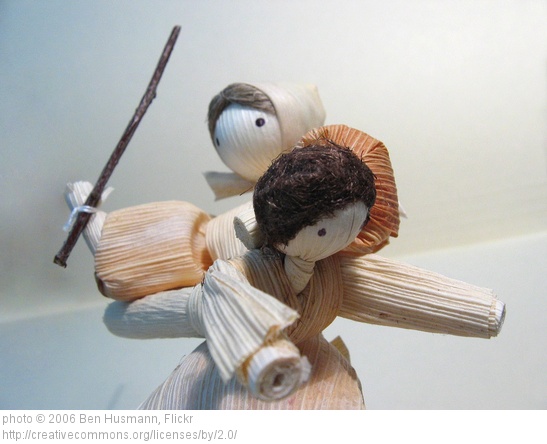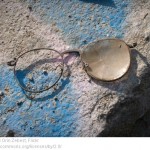[Kurt’s Editor Note: The following article, written by Rachel Boldwyn, reflects my general approach to spanking. Lauren and I have no plans to spank our daughter, for the reasons listed in this article and for various other reasons. With that said, we need to offer grace and understanding in this area. I have no interest in making a blanket statement about the morality of spanking. Many of my friends and family choose/chose to spank – not out of anger – but out of love. To call this abuse, is extreme in my opinion. We do well to avoid judgement in these matters. With that said, we parents have a wonderful opportunity to model nonviolence to our children by choosing alternative methods of discipline. One resource in this area is a book called Positive Discipline: the first three years.]
There is no better time to evaluate our pacifist beliefs than during a time of war. Many of us have been thinking in a new way about what it means to be peacemakers, and wondering how we really can use peaceful means to create peaceful ends. War is an easy backdrop to ask those questions. But what about violence in our own homes? It’s easy to be against it when our children are bickering, or when our high school student gets in a fight. Yet seldom to we allow introspection of our own behavior to see how we can uphold Christ’s model of non-violence through the discipline of our children.
“He who spares the rod, spoils the child.” (an old saying based in part on Proverbs 13:24).
As I read about the “rod” mentioned in Proverbs 13, it brings to mind a familiar Psalm with the same word, but a distinctly different connotation: “Thy rod and thy staff, they comfort me.” I can say with all certainty that my father’s rod did not comfort me! So what, after all, is a rod? This verse is a metaphor for a shepherd and his sheep, God and his followers. We can better know God’s role as shepherd of our lives by understanding the definition of a rod:
The rod is typically a medium length club…<the shepherd> uses it for a variety of purposes, primarily to protect the flock from enemies, direct behavior and examine the well-being of individual sheep. The shepherd can throw it, use it like a club in battle, or gently prod the sheep. It’s a personal tool used for the benefit and blessing of the flock — a symbol of God’s strength, love and activity on our behalf. With a rod, the shepherd is both warrior and intimate care-taker.
The rod is intended to be used both offensively and defensively; to protect the flock from enemies and to prod or examine them. In both senses, it is protective. If this meaning is applied to Proverbs 13, then the verse could be written as follows: “He who spares protection, spoils the child.” The sentiment here is indicative of physical, spiritual, and developmental protection. Throughout the Bible, a shepherd is used analogously for God and his relationship with us, his sheep. But the shepherd never strikes his sheep; when they stray from the fold he gently, yet firmly, uses the rod to guide them back. The rod is symbolic of God’s parental authority and guidance over our lives.
Most frequently, the rod was used by shepherds to prod the sheep back into line when they had wandered. Shepherds did not use the rod for hitting their sheep – they would have used it in event of an animal attack. In fact, neither ancient nor contemporary Jews have ever followed a violent interpretation of this verse. Contextually, this verse is gleaned from an era of many religoius laws, most of which we now determine to be antiquated and would never considering following. Many of those commands and practices are now deemed neither relevant nor practical, and have been readily dismissed.
While a violent expression of guidance could be gleaned from Proverbs 13:24, it is not in line with New Testament teaching. For a violent form of discipline to be directed toward a child, there ought to be further Biblical support than this solitary Proverb. But there are no other examples of physical means being used to discipline the “littlest of these.” Children are continually identified throughout Scripture as a blessing, and Jesus always makes a way for their protection. In Matthew 18:6, Jesus admonishes anyone who would harm a child. We are reminded in verse 3 that, “unless you change and become like little children, you will never enter the kingdom of heaven.” Jesus blesses children even as Paul commands them to obey their parents. As parents, we ought abide by the Biblical guidelines for conflict as stated in Galatians 6:1: “If someone is caught in a sin, you who are spiritual should restore him gently.”
In the Christian community in general, spanking is seen as permissible. Spanking has become a sacrosant parental benefit in a culture that values structure and downplays nurture. But one of our core Anabaptist beliefs is in conflict with this stance. We Mennonites hold to a tradition of non-violence. The US Mennonite Brethren [my particular denomination] Statement of Faith says, “We view violence in its many different forms as contradictory to the new nature of the Christian. We believe that the evil and inhumane nature of violence is contrary to the gospel of love and peace.” An affirmation of spanking is not in sync with the non-violence teachings of Jesus.
Certainly, spanking can be argued as effective. Violence usually is. But we know that we cannot justify our behavior by its effectiveness. Efficacy at the expense of being Christ-like is sinful. God wants our behavior to be from the heart; genuine, not out of fear. He is a loving God, not a God from whom we cower. He calls himself Abba, a close and familiar term similar to Daddy. A father is a symbol of love and protection. We send mixed messages to children when we tell them not to hit, and then use hitting to communicate that very message. Instead, may we use the rod discipline to guide our children’s behavior, not to drive it from the bodies that were made in the image of God.
Abstaining from spanking as a form of discipline does not mean that correction is withheld. There are many other effective ways of disciplining our children, while simultaneously affirming our role as protector. These ways peacefully model the love and guidance Jesus shows us in our sin. Let our Biblically based command for raising our children in the way they should go be, “Follow my example, even as I follow the example of Christ.” (I Cor 11:1).
————————————————————————————————————————————————————–
Rachel Boldwyn is a mom to Greta (6) and Oliver (3), and is completing her Master’s degree in Rhetoric through Fresno Pacific Univesity. She can be reached at goteamRach@gmail.com.


















